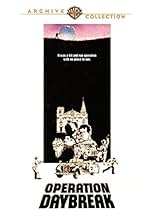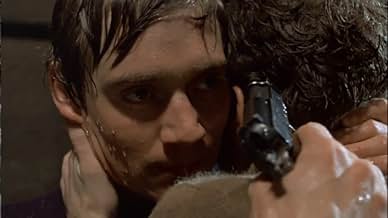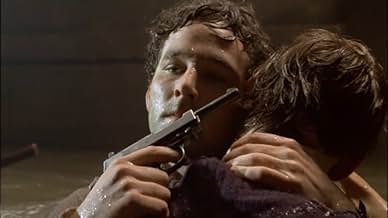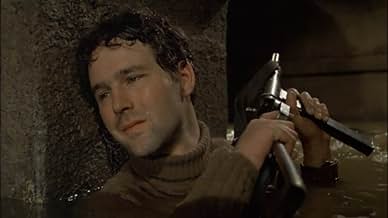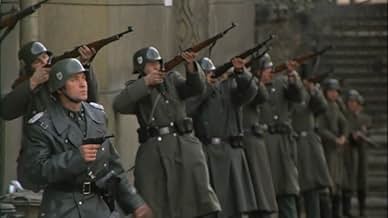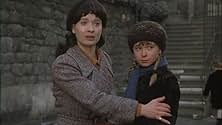VALUTAZIONE IMDb
7,0/10
2501
LA TUA VALUTAZIONE
Aggiungi una trama nella tua linguaIn 1942, Britain sends a group of British-trained Czech commandos to Prague to assassinate SS-General Reinhard Heydrich, head of the Nazi security services.In 1942, Britain sends a group of British-trained Czech commandos to Prague to assassinate SS-General Reinhard Heydrich, head of the Nazi security services.In 1942, Britain sends a group of British-trained Czech commandos to Prague to assassinate SS-General Reinhard Heydrich, head of the Nazi security services.
Reinhard Kolldehoff
- Fleischer
- (as Rene Kolldehoff)
Recensioni in evidenza
Operation Daybreak is an excellent film, I first saw it about 17 years ago and have since watched it several times. The plot is pretty much as it happened, save for some artistic licence with the tear-jerking finale, in real life Kubis(Bottoms) was killed in the prayer loft prior to Gabcik's(Andrew's) suicide. If you go to Prague you may want to check out the Church of Saints Cyril and Methodius on Resslova,near Karlova Nam(Charles Square)Metro station,it's the church in the film and the crypt now houses a museum dedicated to the memory of the Czech peoples suffering at the hands of the Nazi's and Heydrich's assassination. Over the river in Kobylisy is the site of the assassination, two nearby streets have since been named Gabcikova and Kubisova in honour of the assassins.
9ni-8
Yes the music does date the film (were ARP synthesisers ever a good thing) but does that matter? No!!
Some poetic licence is taken with the facts (how Jan Kubis really died or the romance with Anna) but the portrayal of the occupiers, particularly Reichsprotektor Heydrich in no way understated how heinous these people were.
The depiction of siege at St Cyril's conveys a whole range of emotions as tension builds. The motivation of the resistance was unquestionably heroic at this part of the episode.
This is so much more than an action story. However the issues tend to be portrayed in a very polar black / white manner. Even Karel Chudra's motivation is shown in very clear terms (he is treated far less sympathetically in Czech history). It is unfortunate that the film did not have time to develop the political tension between London and the local resistance. How aware was London of the probability of reprisals following the assassination? Was it their intention that reprisals would do more to stir local opposition to the occupation than the assassination itself? Why did Karel Moravec later take his own life?
Overall, however, this is a film to see and for the most part it is very realistic. Visit Prague and leave the tourist traps to see St Cyril's - it looks just like the movie and is almost guaranteed to make you cry for all the victims of the Nazi occupation of Czechoslovakia.
Some poetic licence is taken with the facts (how Jan Kubis really died or the romance with Anna) but the portrayal of the occupiers, particularly Reichsprotektor Heydrich in no way understated how heinous these people were.
The depiction of siege at St Cyril's conveys a whole range of emotions as tension builds. The motivation of the resistance was unquestionably heroic at this part of the episode.
This is so much more than an action story. However the issues tend to be portrayed in a very polar black / white manner. Even Karel Chudra's motivation is shown in very clear terms (he is treated far less sympathetically in Czech history). It is unfortunate that the film did not have time to develop the political tension between London and the local resistance. How aware was London of the probability of reprisals following the assassination? Was it their intention that reprisals would do more to stir local opposition to the occupation than the assassination itself? Why did Karel Moravec later take his own life?
Overall, however, this is a film to see and for the most part it is very realistic. Visit Prague and leave the tourist traps to see St Cyril's - it looks just like the movie and is almost guaranteed to make you cry for all the victims of the Nazi occupation of Czechoslovakia.
While not perfectly accurate in every respect, it is as near to accurate in all of the important respects: the incredible risks (personal and national) and courage of the Czechs; the importance of Heydrich and his cold, brutal and efficient nature; the ending for all involved, in which no punches are pulled; betrayals and loyalty; how, in military operations, always expect the unexpected. Good understated acting, appropriate to the real people. Portrayal of Heydrich equally understated and disturbingly normal. Great music. Haunting, gut-wrenching ending. Slow build-up to climax finely done. I saw the original in the 1970s; video purchased a few years ago is fine except the subtitles are missing for the short German-speaking parts (which I remember in any case). Key event of WWII: if anyone merited assassination, Heydrich did. Quite apart from his activities in "Bohemia and Moravia" where he was known as the "Butcher of Prague", his top position in the SS and police apparatus (second only to Himmler) and his key role in planning and executing the Holocaust left him with the blood of millions on his hands. Of interest, if you watch Wannseekonferenz (1984; German, with English subtitles) and Operation Daybreak back-to-back, you have a continuous and accurate portrayal of Heydrich's last months. The former covers the 90 minutes of the Wannsee meeting in January 1942 in Berlin in which Heydrich, as second most important police official in the Reich, coordinates the implementation and industrialization of the Final Solution, the latter covers from January to June (his death), in which he has added to his CV by becoming the political administrator of Czechoslovakia (also a likely clue to his future ambitions). The two films could not be more different (one almost a stage play, the other more suspense/action), but are unified by excellent portrayals of Heydrich. It also underlines that while the Czechs assassinated Heydrich for purely national reasons, there was no lack of other justifications. If you cannot obtain Wannseekonferenz, the more recent (2001) English remake (Conspiracy, with Kenneth Branagh) will do. IMDb members rate the German version (8.0) slightly higher than Conspiracy (7.7), a judgement I agree with.
I knew nothing about this movie until it popped up on TV one evening during the mid seventies. Being Anthony Andrews fans my wife and I settled down to watch the movie and I also recorded it on my newly acquired beta max video recorder. From the start we were drawn in to the story. The characters, the locations, actors and the magnificent musical score. It's the most moving and convincing film I have ever seen. Knowing the film is based on true events makes it all the more poignant. The pace of the movie and almost gentle unfolding of events gives the viewer time to think. It's not the high speed violence we have become used to in recent years. A film of love and hate and the darkest days of the second world war. The final and perhaps inevitable outcome in the last chapter has become etched into my memory forever. I remember Anthony Andrews saying years later on The Michael Parkinson Show that it was a film he was particularly proud to have been a part of. Too right! A star studded cast which so often can be the kiss of death in a film proved to be not the case. Every character was essential and all the actors played their parts well.I have tried to get this film on VHS and DVD but unsuccessfully. It is a film that has had quite a profound effect on the way I think. If you have never seen this movie but are given the chance to watch it, keep a tissue in your pocket. It's a tearjerker.
This detailed account of the assassination of Reinhard Heydrich in 1942, and the tragic aftermath, is likely about as accurate as any dramatic film is likely to be on the subject. The Nazis took an appallingly vicious revenge, and this film is a compelling, somewhat flawed, saga of the great tragedy that is war and conquest. Was the killing of Heydrich, the "Hangman" to the Czechs, really necessary, considering the consequences? It must have seemed so to the British brass and the willing Czech volunteers, but one wonders what the completely uninvolved victims in Lidice may have thought. Viewed as part of the overall slaughter of millions in the course of WW2, these were small numbers of victims, but is even one death negligible? Did Heydrich's removal shorten the war at all? You will have to find your own answers.
As a cinematic action film, this is not an especially inspired production. The story of the parachuting in from British RAF planes of an assassination team proceeds rather slowly until the final battle at the church where the seven partisans were hiding. The German efforts to dislodge them are shown in a detail that may owe something to extrapolation from the facts. Who knows? In any case this is the exciting part of the film. As shown the seven wiped out simply hordes of attacking Germans before the last two took their own lives. There is no question but that in reality the partisans put up quite a fight. They would have had no incentive to surrender meekly to Nazi "mercy".
Acting, except for the very convincing portrayal of Heydrich by Anton Diffring, is generally lackluster, with a few exceptions, and the editing can only be described as choppy. The language convention may seem a tad strange. Conversations that would obviously have been in Czech, are given in English. Conversations in German, occur in German, without subtitles. If you aren't fluent in German, you may miss some nuances. Since few of the cast are Czechs, there is not much slavic flavor evident. Who knows, this may enhance the more universal message that "war is hell". Oh, and did Gabcik and Kubis really take their own lives at the end?
As a cinematic action film, this is not an especially inspired production. The story of the parachuting in from British RAF planes of an assassination team proceeds rather slowly until the final battle at the church where the seven partisans were hiding. The German efforts to dislodge them are shown in a detail that may owe something to extrapolation from the facts. Who knows? In any case this is the exciting part of the film. As shown the seven wiped out simply hordes of attacking Germans before the last two took their own lives. There is no question but that in reality the partisans put up quite a fight. They would have had no incentive to surrender meekly to Nazi "mercy".
Acting, except for the very convincing portrayal of Heydrich by Anton Diffring, is generally lackluster, with a few exceptions, and the editing can only be described as choppy. The language convention may seem a tad strange. Conversations that would obviously have been in Czech, are given in English. Conversations in German, occur in German, without subtitles. If you aren't fluent in German, you may miss some nuances. Since few of the cast are Czechs, there is not much slavic flavor evident. Who knows, this may enhance the more universal message that "war is hell". Oh, and did Gabcik and Kubis really take their own lives at the end?
Lo sapevi?
- QuizGeorge Sewell plays two parts in this movie; he is a German officer, seen at the film's climax, and also briefly plays Adolf Hitler.
- BlooperJan Kubis did not commit suicide in the basement. He died in the fight inside the main section of the church.
- Curiosità sui creditiThe end credits show what happened to the real people portrayed in the film.
- Versioni alternativeBBFC cuts were made to the original UK cinema version to remove blood spurts from a machine gunning. The 1987 video release was uncut.
- ConnessioniFeatured in Storyville: The Real Great Escape (2012)
I più visti
Accedi per valutare e creare un elenco di titoli salvati per ottenere consigli personalizzati
- How long is Operation Daybreak?Powered by Alexa
Dettagli
- Data di uscita
- Paesi di origine
- Lingue
- Celebre anche come
- Operation Daybreak
- Luoghi delle riprese
- Aziende produttrici
- Vedi altri crediti dell’azienda su IMDbPro
- Tempo di esecuzione1 ora 58 minuti
- Mix di suoni
- Proporzioni
- 1.85 : 1
Contribuisci a questa pagina
Suggerisci una modifica o aggiungi i contenuti mancanti

Divario superiore
What is the French language plot outline for E l'alba si macchiò di rosso (1975)?
Rispondi

